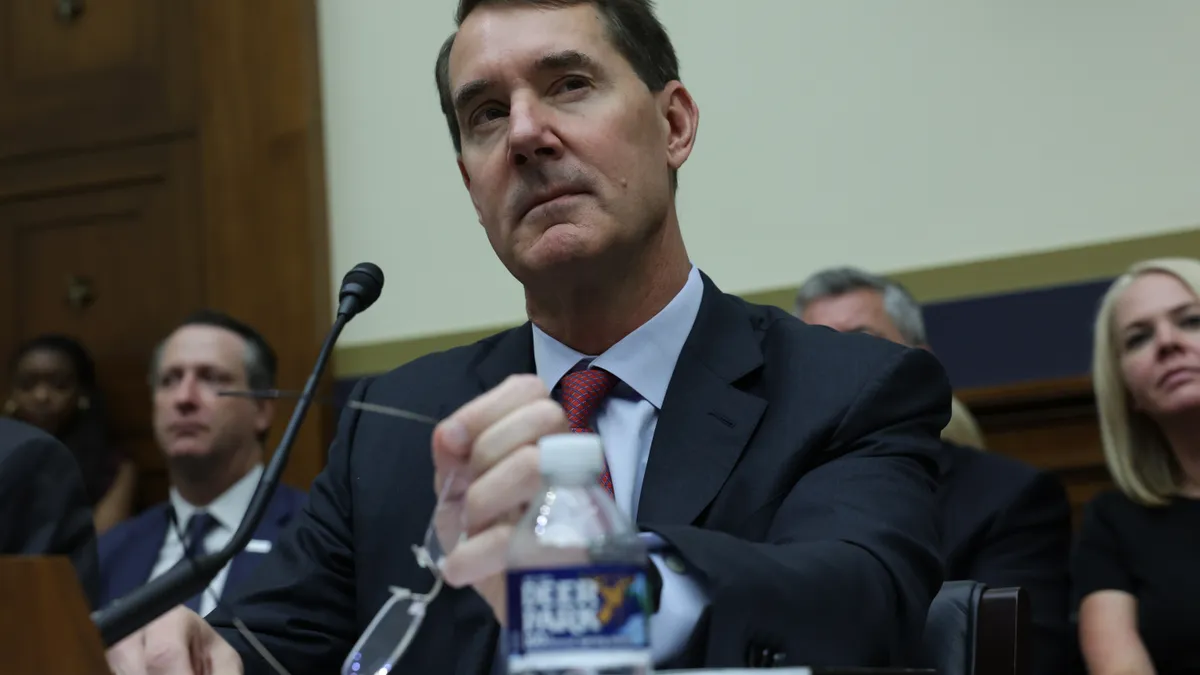PNC needs to “pretty aggressively” step up its retail presence in newer markets to support its long-term push for growth in its corporate and institutional banking business, CEO Bill Demchak said Monday.
“We need to make sure that we’re creating a core deposit franchise to fund that in the long term,” the CEO of the Pittsburgh-based bank said.
The super-regional is spending about $1 billion to build new branches and refurbish others over the next four years, as part of its push to gain “substantial” share in some newer markets, Demchak said. Areas of focus for the branch efforts include major cities in Texas, as well as Miami and Denver.
Right now, organic growth is far more of a focus for the $557 billion-asset lender than trying to grow through acquisitions, Demchak said.
“We’re going to build the place, and I think we can,” Demchak told Barclays analyst Jason Goldberg during a Monday conference appearance.
However, bigger rivals JPMorgan Chase and Bank of America have Demchak looking over his shoulder.
“Big banks building branches in every city in America, long term, is a concern,” the CEO said. “So we need to fight that. That’s my worry.”
Demchak expressed confidence in PNC’s ability to grow its corporate and institutional banking unit, and said the bank has had success replicating its strategy with that segment in new markets.
Last year, revenue at PNC’s corporate and institutional banking unit rose 6%, totaling $9.4 billion, according to the bank’s annual filing. For the second quarter, the bank’s earnings in that segment fell 7% year over year, average loans were stable, and average deposits dipped 2%.
But PNC – which had $416 billion in deposits as of June 30 – is tasked with growing its deposit share while JPMorgan and BofA might end up growing their shares organically at a pace of “a PNC every five or six years,” Demchak said.
To combat that, PNC needs to ensure it’s picking up its share of business over time, and Demchak envisions open banking facilitating that. The Consumer Financial Protection Bureau issued its long-awaited open banking proposal last October, and said in June it will finalize the rule in coming months.
“We’ll pull share out of smaller banks who won’t have the technology to be able to take advantage of open banks,” Demchak said.
Regulators are “doing this because they think they’re going to lower switching costs,” he said. “All they’re going to do is drain [small] banks of accounts, by big banks who have the technology.”
Acting Comptroller of the Currency Michael Hsu has noted open banking’s instant account portability could lead to an increase in retail outflows for banks.
For PNC’s part, “I need to make sure that of all the 5,000 other banks who are going to be drained by the giant banks, that we’re doing our share of growth inside of that,” Demchak said. “We get there through a different in-market model, leading-edge technology, obsession about clients, and not being one of the big bad guys.”
Acquisitions could help the bank quickly achieve scale, but Demchak said PNC isn’t looking to pay “a silly price” for a “busted” franchise.
The bank has considered a number of potential acquisition targets, and “increasingly, the deposit franchises of some … players are becoming deteriorated,” with more “hot money,” brokered and high-rate deposits, he said. And the asset side of the balance sheet is increasingly focused on commercial real estate.
As for the possibility of a merger of equals between PNC and a rival, Demchak expects that “would be in the waiting room for the rest of our lives,” from a regulatory standpoint.
In the long term, once the financials around a potential deal make more sense, it’s far more likely PNC will do fast and efficient “in-market, small deals, with really high cost-takeout numbers,” he said, where “cost saves pay for the sins of the balance sheet.”














